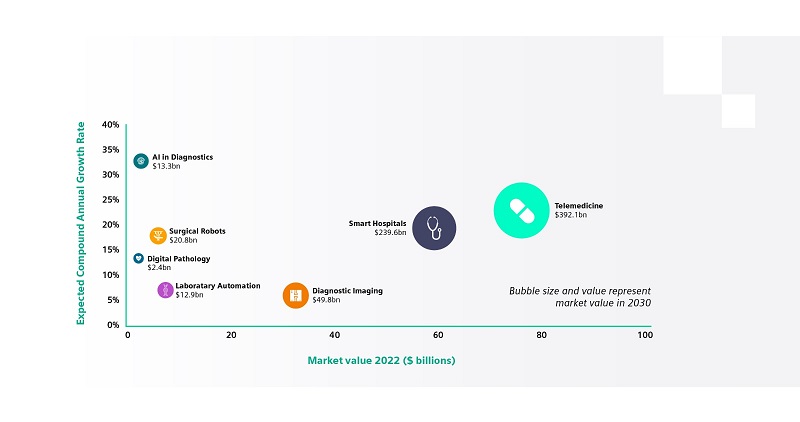Pressure is mounting on healthcare organisations to accelerate adoption of digital and AI-driven technologies – proven to deliver significant benefits to delivery of care, patient outcomes, and operational costs.
To illustrate the breadth of this challenge, a new Insight Paper from Siemens Financial Services (SFS) estimates the market size and the projected growth rate for several key medical technologies, including diagnostic imaging, smart hospital conversion, laboratory automation, and telemedicine.
However, the significant levels of investment required cannot typically be afforded through available healthcare capital budgets and the paper finds that specialist smart finance will play a crucial role in enabling the development and digitalisation of healthcare systems around the world moving forward.
Smart finance can make acquiring technology cashflow friendly, overcome limitation of constrained capital budgets, and help providers achieve the best-possible care and outcomes for patients
The paper, entitled Digital Transformation in Healthcare, explores the many areas where digital and AI-driven technologies can tangibly improve clinical efficiency, patient outcomes, and cost optimisation. And its applications range from replacing or upgrading ageing equipment to enhance diagnostics and throughput; to digitalising infrastructure and buildings technology in the face of rising energy costs and emissions targets.
The market for smart hospitals is expected to reach a value of 9.6billion by 2030, according to the report
Under pressure
However, the research also finds that given the myriad of pressures facing the sector – including pandemic backlogs and stretched budgets – current levels of funding will be insufficient to support the transformation.
Private sector finance will therefore be required to meet the investment challenges ahead in the face of rapid market growth to 2030.
“Healthcare organisations are well aware of the benefits of digital adoption, but many face real hurdles to investment in practice,” explains Chris Wilkinson, spokesman for Siemens Financial Services (SFS) UK.
“Smart finance can make acquiring technology cashflow friendly, overcome limitation of constrained capital budgets, and help providers achieve the best-possible care and outcomes for patients.”
The value of the medical technologies market is expected to continue to grow between now and 2030.
Among the fastest-growing areas are Al in diagnostics (32.5% CAGR), telemedicine (22.9%), and smart hospitals (19.3%).
The value of telemedicine, for example, is predicted to achieve $392.2billion USD by 2030 from £75.3billion in 2022.
The report evidences the enabling power of smart finance for healthcare technology vendors and healthcare providers alike, providing an affordable and financially-sustainable approach to acquiring digital and AI-driven technology
Likewise, smart hospitals are estimated to reach a value of $239.6billion from their current $58.6billion market share.
“Whatever the technology and its anticipated growth, each presents an investment challenge requiring smart private sector finance – whether coping with replacement/renewals or to take advantage of the rapid growth of novel technologies, or both,” said Wilkinson.

Increasing value
“The report evidences the enabling power of smart finance for healthcare technology vendors and healthcare providers alike, providing an affordable and financially-sustainable approach to acquiring digital and AI-driven technology.”
To achieve this, the report outlines three main areas where smart finance makes investment possible, detailing the range of solutions and their benefits. These are:
- Equipment and technology replacement and upgrade
- New technology acquisition
- Smarter building transformation
